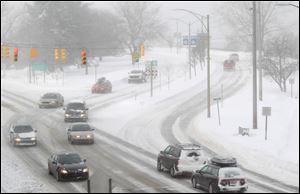
EDITORIAL
Michigan should clear the road of onerous fees
11/22/2017

Traffic moves in cold and snowy conditions Jan. 7, 2014 along U.S. 31 near West Grand Traverse Bay in Traverse City, Mich. The state should reconsider its onerous fees that have left roughly 317,000 people without licenses.
In Michigan, more than 300,000 drivers are on the roads illegally because they lost their license over an unpaid fee. They did not lose their licenses for driving recklessly or not paying court-ordered fines but for failing to pay onerous state fees.
Now is the time for Michigan to forgive those fees and restore licenses to the people who could not afford to pay their fees.
In 2003, facing terrible budget woes, Michigan created “driver responsibility fees” that tacked penalties ranging from $100 to $2,000 on top of the court-ordered fines drivers faced for traffic citations. Drivers who have not paid the fees lose the right to renew their license.
Now, Michigan drivers owe more than $600 million in unpaid driver responsibility fees and many do not have valid licenses because of that.
At face value, it seems reasonable to make irresponsible driving costly. But then-Gov. Jennifer Granholm and the state Legislature did not have improving the safety of Michigan’s roads on their minds when they created the fees. They needed to fill a hole in the state budget and the $20 million a year generated by the fees helps accomplish that.
Many of the drivers who no longer have valid licenses live in Michigan’s urban areas. And without a valid license, getting stopped again for speeding or any other infraction comes with the added jeopardy of being charged with driving without a license.
Recognizing that the driver responsibility fees are regressive and unfair, the Legislature wisely passed a measure phasing out the fees by 2019.
But what about the 317,000 drivers who still cannot renew their licenses because they owe part of the $634 million in uncollected fees?
A bill passed by the state Senate last month would eliminate some of the debt by forgiving unpaid fees that are at least six years old. That accounts for a little more than half of the unpaid $634 million. It is resisting total forgiveness because of the effect on the state’s finances.
That is a start, but hardly good enough to make up for the ills these fees have created. In the House, a series of bills have passed that would forgive all debt through community service and would allow for reinstatement of a debtor’s driver’s license.
The House effort makes the most sense, but there is still hard work to do to hammer out an agreement with the Senate before a bill goes to Gov. Rick Snyder.
Not having a valid driver’s license is a serious impediment to people who need to get to school, or to get their families around.
More than that, not having a valid licence makes it difficult for people to get to work or even to get a job that requires a valid license. And if Michigan really wants to fill its coffers with fairly collected revenue, its residents need to work.